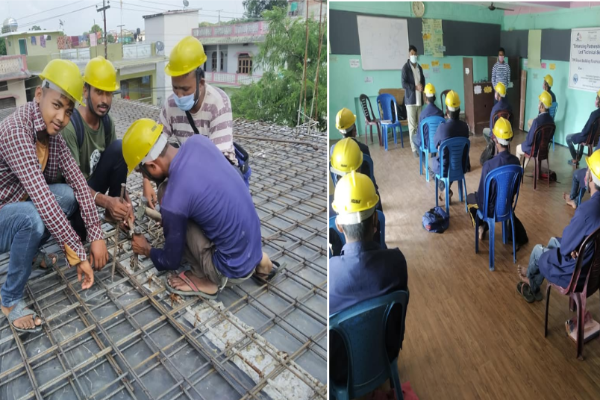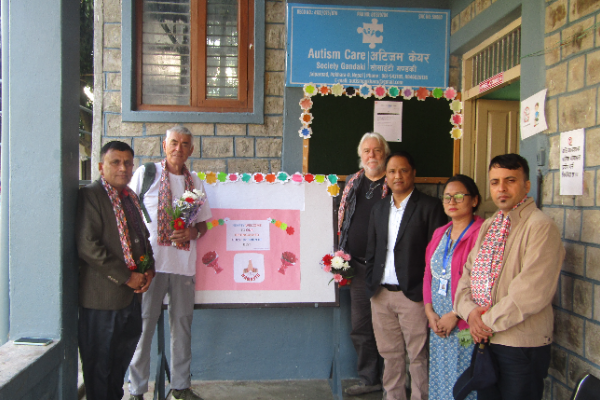NEKEPA is a 36 months project funded by DFID. The project is implemented by WVAF in partnership with Backward Education Society (BASE), a Dang based NGO as the lead. The project commenced from 1st January 2013 and is implemented in Dang, Kailali, Kanchanpur, Banke and Bardiya districts of the country. The NEKEPA project supports Nepal’s ex-Kamaiya community; a group of 186,700 highly marginalised freed bonded labours, many of whom have not received the rehabilitation entitlements promised to them by the Government of Nepal when they were freed in 2000. The project is supporting ex-Kamaiya community to gain their rehabilitation entitlements, productive employment to reduce extreme poverty, and support their children to complete a full course in primary education.
Vision: To contribute in the process of poverty alleviation and eradication of illiteracy and eventually support to achieve the millennium development goal through several engagements.
Objective: The overriding objectives of the project are listed below:
- To advocate for the reformation of several policies related with ex bonded laborers
- To contribute in the process of improving the access of children of ex bonded laborers to education
- To contribute in the process of achieving millennium development goals by eradicating extreme poverty
Output 1 – National level activities to hold duty bearers to account regarding ex-Kamaiya rights:
Output 2 – District level activities to hold duty bearers to account regarding ex-Kamaiya rights
Output 3 – Non-formal education, formal education and vocational training for ex-Kamaiya children:
Output 4 – Sustainable livelihood training and support for ex-Kamaiya adults
Output 5 – Leadership and para-legal training for ex-Kamaiya leaders
Major activities of the project include:
- Inception workshop.
- National level advocacy with government officials.
- Press Meet.
- Parents awareness meetings.
- District Stakeholders Meetings
- School Awareness Campaign
- District Watchdog Committees meeting
- Local Media Campaign
- NFE teacher training.
- NFE Preparatory class
- Formal education enrollment support.
- Formal education material support.
- Formal education infrastructure support.
- Vocational training
- Training of Trainers (ToT) on saving and credit mobilization
- Training on saving and credit mobilization.
- Training of Trainers (ToT) on book keeping and account.
- Training on book keeping and account.
- Livestock raising support.
- Support to establish retail shops.
- Support for agro based micro enterprises
- Farmers to Farmers training
- Vocational training for adults
- Leadership and skills develop training
- Paralegal training
Previous Projects:
- Enhancing Cultural Diversity for Dignity and Development of Indigenous Communities in Nepal
Enhancing Cultural Diversity for Dignity and Development of Indigenous Communities in Nepal was a 3 year project funded by the European Union (EU) and implemented since January 2010 in 80 selected Village Development Committees (VDCs) from 8 project districts namely Kavrepalanchowk, Rasuwa, Dhading, Chitwan and Makwanpur in the Central Region of Nepal and Lamjung, Kaski and Gorkha in the Western Region of Nepal. The project was implemented by WVAF as the national partner in consortium with the Institute of Governance and Development (IGD), as the lead and 3 national Indigenous Peoples Organizations namely, Nepal Tamang Ghedung (NTG), Gurung Tamu National Council (GTNC) and Nepal Chepang Association (NCA). WVAF is leading the Institution and Capacity Building Component of the project. The target groups/final beneficiaries include Indigenous people. The Gurungs, the Tamangs and the Chepangs, and their organizations and institutions in the selected 80 VDCs (10 VDCs from each district) from 8 project districts, other IPOs and networks at district and national level, human rights organizations, indigenous rights activists, political parties, elites, media are considered as collaborators in the project.
Overall objective/Goal of the project: To contribute in protection and promotion of cultural diversity and creativity for improving wellbeing and dignity of indigenous communities in Nepal.
Specific objectives of the project:
- Promote cultural diversity and intercultural dialogues at local and national levels.
- Promote awareness on the need of cultural diversity and conservation of cultural heritage.
- Enhance institutional capacity and creativity in cultural products as means of livelihoods.
Expected Results of the Project:
- Improved understanding on cultural issues such as importance of culture, cultural rights and cultural diversity.
- Reduction of the incidences of culture based discriminations.
- Contributed to respect for all cultures equally for coexistence.
- Formulated relevant policies and plans to protect indigenous culture and cultural entitlements.
- Established cultural rights as fundamental rights to protect and promote indigenous culture and cultural diversity.
- Recognized and ensured protection of indigenous culture and knowledge system in the new constitution.
Major activities of the project included:
- Pursue social and political dialogues in the field of culture diversity and exchange
- Influence policy to adopt necessary measures for the promotion of the diversity of cultures
- Celebrate cultural events and promote cultural tourism
- Pursue political dialogues to ascertain cultural rights in the new constitution
- Promote creativity in education by using best cultural practices
- Awareness building on need of culture value, cultural diversity and for conservation of cultural heritage
- Development of cultural forum for collaboration to fight against cultural discriminations
- Use and replication of best traditional practices
- Protection of unique culture and renovation of unique cultural heritage
- Institutional capacity building of IPOs
- Support to and enhance competency of artist and creator of culture goods and enterprises
- Development of forum for artists and creator of culture goods
- Promote access to market for culture goods and service
- Identify and develop effective partnership between cultural and other sectors to reinforcement investment in



